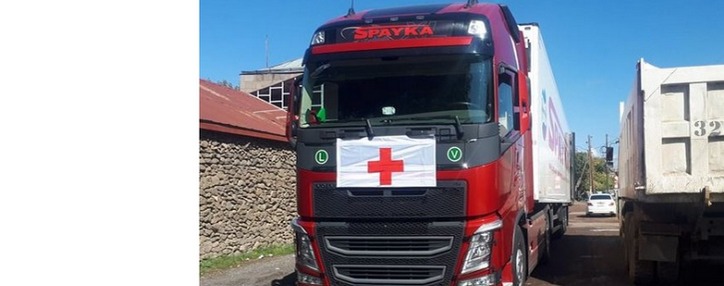Over $ 3.1 million provided to Armenian Red Cross Society for financing urgent needs of people from Artsakh and Armenia
01.12.2020,
14:27
The Armenian Red Cross Society has received over $ 3.1 million from partners of the International Red Cross and Red Crescent Movement, as well as international and local organizations, the press service of the International Committee of the Red Cross (ICRC) reported on Tuesday.

YEREVAN, December 1. /ARKA/. The Armenian Red Cross Society has received over $ 3.1 million from partners of the International Red Cross and Red Crescent Movement, as well as international and local organizations, the press service of the International Committee of the Red Cross (ICRC) reported on Tuesday.
These funds are provided to finance the most urgent needs of people from Artsakh and Armenia.
In its statement, the ICRC says that with winter approaching and humanitarian needs increasing, medium-term programs are being developed also to provide people with basic necessities and basic services, such as the availability of heating, electricity and water.
It is also reported that the Armenian Red Cross Society assisted people who found shelter in private places of residence, providing them with access to basic services (electricity, heating and water), allocating AMD 311 million to pay utility bills for November.
In total, the Armenian Red Cross Society, in cooperation with the Armenian government and local government bodies, provided humanitarian aid to over 45,000 people in 34 districts in Yerevan and nine provinces of Armenia.
People were provided with food, clothing, hygiene products, bedding, personal necessities, medical equipment, strollers, walkers and walking sticks.
About Artsakh War
From September 27 to November 9, the Azerbaijani Armed Forces, with the participation of Turkey and foreign mercenaries and terrorists recruited by it, carried out aggression against Artsakh at the frontline and in the rear using rocket and artillery weapons, heavy armored vehicles, military aircraft and prohibited types of weapons (cluster bombs, phosphorus weapons). The strikes were delivered also at civil and military targets on the territory of Armenia.
On November 9, the leaders of the Russia, Azerbaijan and Armenia signed a statement on the cessation of all hostilities in Artsakh. According to the document, the parties stop at their positions. The city of Shushi, Agdam, Kelbajar and Lachin regions pass over to Azerbaijan, with the exception of a 5-kilometer corridor connecting Karabakh with Armenia. A Russian peacekeeping contingent will be deployed along the contact line in Karabakh and along the Lachin corridor. Internally displaced persons and refugees are returning to Karabakh and adjacent regions, prisoners of war, hostages and other detained persons and bodies of the dead are exchanged. -0-
These funds are provided to finance the most urgent needs of people from Artsakh and Armenia.
In its statement, the ICRC says that with winter approaching and humanitarian needs increasing, medium-term programs are being developed also to provide people with basic necessities and basic services, such as the availability of heating, electricity and water.
It is also reported that the Armenian Red Cross Society assisted people who found shelter in private places of residence, providing them with access to basic services (electricity, heating and water), allocating AMD 311 million to pay utility bills for November.
In total, the Armenian Red Cross Society, in cooperation with the Armenian government and local government bodies, provided humanitarian aid to over 45,000 people in 34 districts in Yerevan and nine provinces of Armenia.
People were provided with food, clothing, hygiene products, bedding, personal necessities, medical equipment, strollers, walkers and walking sticks.
About Artsakh War
From September 27 to November 9, the Azerbaijani Armed Forces, with the participation of Turkey and foreign mercenaries and terrorists recruited by it, carried out aggression against Artsakh at the frontline and in the rear using rocket and artillery weapons, heavy armored vehicles, military aircraft and prohibited types of weapons (cluster bombs, phosphorus weapons). The strikes were delivered also at civil and military targets on the territory of Armenia.
On November 9, the leaders of the Russia, Azerbaijan and Armenia signed a statement on the cessation of all hostilities in Artsakh. According to the document, the parties stop at their positions. The city of Shushi, Agdam, Kelbajar and Lachin regions pass over to Azerbaijan, with the exception of a 5-kilometer corridor connecting Karabakh with Armenia. A Russian peacekeeping contingent will be deployed along the contact line in Karabakh and along the Lachin corridor. Internally displaced persons and refugees are returning to Karabakh and adjacent regions, prisoners of war, hostages and other detained persons and bodies of the dead are exchanged. -0-



